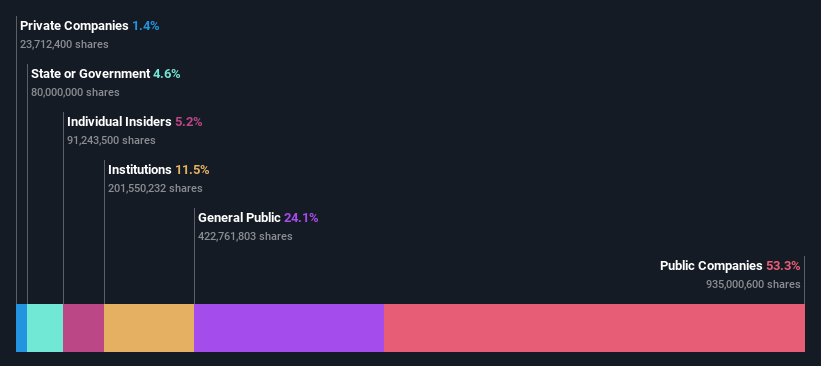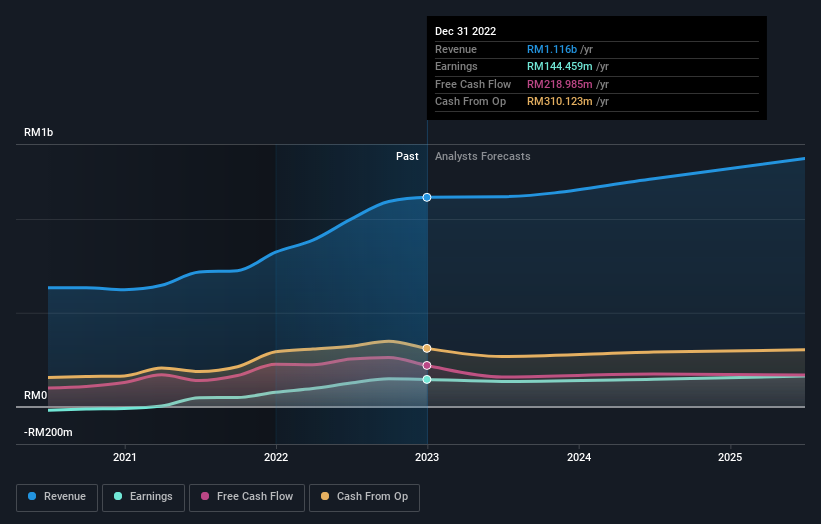Public companies are Berjaya Food Berhad's (KLSE:BJFOOD) biggest owners and were hit after market cap dropped RM158m
Key Insights
The considerable ownership by public companies in Berjaya Food Berhad indicates that they collectively have a greater say in management and business strategy
The largest shareholder of the company is Berjaya Corporation Berhad with a 51% stake
To get a sense of who is truly in control of Berjaya Food Berhad (KLSE:BJFOOD), it is important to understand the ownership structure of the business. We can see that public companies own the lion's share in the company with 53% ownership. Put another way, the group faces the maximum upside potential (or downside risk).
As a result, public companies as a group endured the highest losses last week after market cap fell by RM158m.
Let's take a closer look to see what the different types of shareholders can tell us about Berjaya Food Berhad.
Check out our latest analysis for Berjaya Food Berhad
What Does The Institutional Ownership Tell Us About Berjaya Food Berhad?
Institutional investors commonly compare their own returns to the returns of a commonly followed index. So they generally do consider buying larger companies that are included in the relevant benchmark index.
We can see that Berjaya Food Berhad does have institutional investors; and they hold a good portion of the company's stock. This suggests some credibility amongst professional investors. But we can't rely on that fact alone since institutions make bad investments sometimes, just like everyone does. If multiple institutions change their view on a stock at the same time, you could see the share price drop fast. It's therefore worth looking at Berjaya Food Berhad's earnings history below. Of course, the future is what really matters.
Hedge funds don't have many shares in Berjaya Food Berhad. The company's largest shareholder is Berjaya Corporation Berhad, with ownership of 51%. This essentially means that they have extensive influence, if not outright control, over the future of the corporation. Hong Leong Asset Management Bhd is the second largest shareholder owning 5.8% of common stock, and Pertubuhan Keselamatan Sosial holds about 4.6% of the company stock.
While it makes sense to study institutional ownership data for a company, it also makes sense to study analyst sentiments to know which way the wind is blowing. There are a reasonable number of analysts covering the stock, so it might be useful to find out their aggregate view on the future.
Insider Ownership Of Berjaya Food Berhad
The definition of company insiders can be subjective and does vary between jurisdictions. Our data reflects individual insiders, capturing board members at the very least. Company management run the business, but the CEO will answer to the board, even if he or she is a member of it.
I generally consider insider ownership to be a good thing. However, on some occasions it makes it more difficult for other shareholders to hold the board accountable for decisions.
We can see that insiders own shares in Berjaya Food Berhad. In their own names, insiders own RM74m worth of stock in the RM1.4b company. This shows at least some alignment. You can click here to see if those insiders have been buying or selling.
General Public Ownership
With a 24% ownership, the general public, mostly comprising of individual investors, have some degree of sway over Berjaya Food Berhad. While this group can't necessarily call the shots, it can certainly have a real influence on how the company is run.
Public Company Ownership
We can see that public companies hold 53% of the Berjaya Food Berhad shares on issue. This may be a strategic interest and the two companies may have related business interests. It could be that they have de-merged. This holding is probably worth investigating further.
Next Steps:
It's always worth thinking about the different groups who own shares in a company. But to understand Berjaya Food Berhad better, we need to consider many other factors. To that end, you should be aware of the 1 warning sign we've spotted with Berjaya Food Berhad .
But ultimately it is the future, not the past, that will determine how well the owners of this business will do. Therefore we think it advisable to take a look at this free report showing whether analysts are predicting a brighter future.
NB: Figures in this article are calculated using data from the last twelve months, which refer to the 12-month period ending on the last date of the month the financial statement is dated. This may not be consistent with full year annual report figures.
Have feedback on this article? Concerned about the content? Get in touch with us directly. Alternatively, email editorial-team (at) simplywallst.com.
This article by Simply Wall St is general in nature. We provide commentary based on historical data and analyst forecasts only using an unbiased methodology and our articles are not intended to be financial advice. It does not constitute a recommendation to buy or sell any stock, and does not take account of your objectives, or your financial situation. We aim to bring you long-term focused analysis driven by fundamental data. Note that our analysis may not factor in the latest price-sensitive company announcements or qualitative material. Simply Wall St has no position in any stocks mentioned.
Join A Paid User Research Session
You’ll receive a US$30 Amazon Gift card for 1 hour of your time while helping us build better investing tools for the individual investors like yourself. Sign up here


